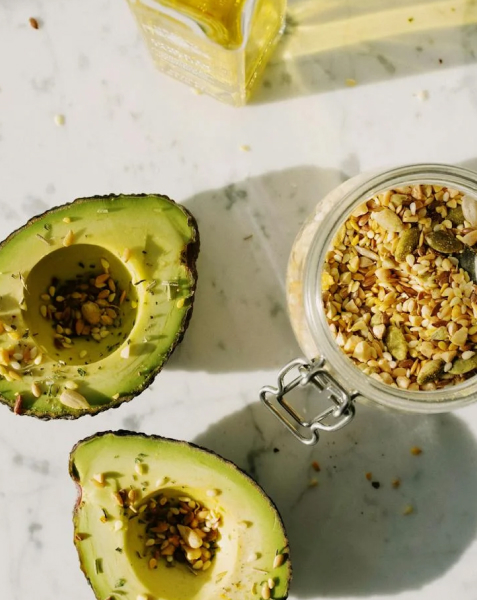Food trends are constantly evolving, in response to the seasons, popular ingredients, or what’s going viral on social media. A large part of this involves discussions around ways of eating which go into minute detail, with strict rules that can feel overwhelming or impossible to stick to. Advocates confidently share the quick-fixes or benefits of certain diets, but it’s important to get all the facts before changing your eating patterns. In this first instalment of a new series, 4 of our expert nutritionist contributors will break down the most popular diets, advising you from a science-backed, nutritionally-informed perspective about the pros and cons. This week, they offer their take on the ketogenic (or ‘keto’) diet.
Rosemary Martin, Dietitian (BSc MSc RD)
The ketogenic (or “keto”) diet is a very low-carb, high fat diet. The aim of the diet is to change the body’s primary energy source from sugars to fats. Typically, the body gets energy from the glucose in carbohydrates, but when following an extremely low-carb diet, the body is starved of glucose. Instead, it burns fat for fuel - a process called “ketosis” which produces “ketones” (1). The keto diet is much stricter than a ‘low carb’ diet, using severe and maintained carbohydrate restriction to mimic starvation and induce the production of ketones. To achieve this, the keto diet is made up of a large quantity of fat, moderate protein, and it either excludes or dramatically reduces grains, dairy, legumes, and starchy fruits and vegetables like peas, bananas and carrots. It is therefore challenging to achieve a balanced diet when eating this way.
Rohini Bajekal, Nutritionist and Board-Certified Lifestyle Medicine Professional (MA Oxon MSc Dip IBLM)
While there is evidence that this diet may result in short term weight loss, it can negatively impact both physical and mental health. The typically high saturated fat content of the diet increases inflammation and risk of cardiovascular disease. This diet also restricts or eliminates many of the foods that are linked with reducing the risk of chronic diseases. Carbohydrates are the body’s main source of fuel, so fatigue and brain fog are a common side effect for many trying this diet. As a nutritionist, I always encourage people to focus on what they can add to their diet instead of restricting.
Sinéad Berry, Registered Nutritionist (MSc, mBANT, rCNHC)
Fans of the keto diet rave about its effectiveness for quick short-term weight loss. But there’s only limited research highlighting its health benefits. Potential positive impacts include improvements to blood sugar balance, insulin resistance, blood pressure, cholesterol and other health conditions such as PCOS (2) and even some cancers (3). However, much more research is needed in these areas.
On the flip-side, it’s a very restrictive, extreme way of eating that takes a lot of planning, is difficult to do properly (particularly if you’re plant-based) and to sustain long-term. The keto diet goes against what we understand to be a healthy, balanced diet which typically promotes a balance of carbs, protein and fat. The carb restrictions mean that you’ll be cutting out pulses, wholegrains, fruit, and starchy vegetables — all of which provide vitamins, minerals, antioxidants, phytochemicals and fibre. Excluding them may impact your gut function and overall health. If managing a healthy weight is your goal, the keto diet isn’t the only way to do this; plus the level of carbs to get a person into ketosis is dependent on many individual factors.
Jessica Shand, Naturopathic Nutritionist (NTP)
Whilst studies suggest that the keto diet can reduce blood sugar and insulin levels and manage certain diseases such as T2D (4), it can be very challenging to sustain for a long period of time. It is also highly restrictive and, because of this, it could contribute to disordered eating patterns. From a nutritional perspective, as the keto diet is so low in gut-feeding fibre, pre- and probiotics and phytochemicals, this way of eating is low in many of the health-enhancing nutrients needed for the body to function optimally. Being low in gut-feeding fibre, the keto diet can also have a negative impact on the health of the gut microbiome and balance of bacteria needed to support optimum health and support immunity. It’s important to consider the impact any form of restrictive diet might have on the systems that keep your body functioning and dictate your overall health and wellbeing. The keto diet is not one to try without doing your research!
References
1. Wheless JW. History of the ketogenic diet. Epilepsia. 2008;49 Suppl 8:3-5. doi:10.1111/j.1528-1167.2008.01821.x
2. Karniza Khalid, Saraswathy Apparow, Irma Liyana Mushaddik, Amalina Anuar, Syed A A Rizvi, Anasufiza Habib. Effects of Ketogenic Diet on Reproductive Hormones in Women With Polycystic Ovary Syndrome. Journal of the Endocrine Society. 2023;7(10):bvad112.
3. Hersant H, Grossberg G. The Ketogenic Diet and Alzheimer's Disease. J Nutr Health Aging. 2022;26(6):606-614.
4. https://pubmed.ncbi.nlm.nih.gov/30289048/















